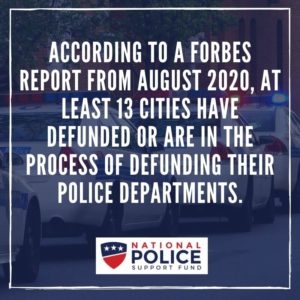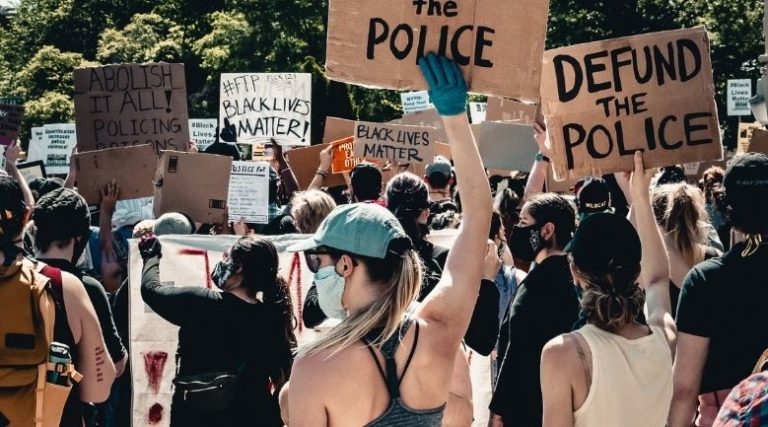More than six months after Black Lives Matter protests broke out across the United States, several cities and towns have started the process of yielding to activist demands and defunding their police departments.
Let’s take a look at where these places are and what happens when cities defund police departments.
Defund the Police Explained
According to Rashawn Ray, a sociologist and fellow at the Brookings Institution, “Defund the police” means reallocating or redirecting funding away from the police department to other government agencies funded by the local municipality.”
Ray is quick to point out that defunding the police does not mean abolishing the police, but any resources, financial or otherwise, mean fewer police officers on the streets to help keep our communities safe. In fact, CNN reports that “Those seeking to disband police consider defunding an initial step toward creating an entirely different model of community-led public safety.”
So-called “community-led public safety” is not led by police and pushes police to the background or out of the picture entirely. Where does the money taken from the police go? The answer varies by city but generally falls into a few buckets.
“Those dollars can be used to fund schools, hospitals, housing and food in those communities, too — “all of the things we know increase safety,” Phillip McHarris, a doctoral candidate in sociology at Yale University and lead research and policy associate at the Community Resource Hub for Safety and Accountability, told CNN.
Schools, hospitals, and housing are great, but they do not keep violent criminals off the streets in the same way that police do. This simple fact has started to play out in cities across the United States.
What Cities Have Defunded Police?
According to a Forbes report from August 2020, at least 13 cities have defunded or are in the process of defunding their police departments:

- New York City
- Washington, D.C.
- Baltimore
- Philadelphia
- Los Angeles
- San Francisco
- Atlanta
- Minneapolis
- Seattle
- Salt Lake City
- Portland, Oregon
- Hartford, Connecticut
- Norman Oklahoma,
- Austin, Texas
According to Forbes, funding cuts ranged from $1 billion in New York City to $3.5 million in Seattle and $850,000 in smaller cities like Norman, Oklahoma. However, Forbes also reports that several cities have increased police spending, including Houston, San Diego, Nashville, and Durham, North Carolina.
What Happens When Cities Defund Police Departments?
While anti-police advocates like to say that defunding measures do not have an impact on violent crime, the statistics clearly tell a different story.
In Minneapolis, homicides increased by 60% in 2020, with many of the crimes left unsolved because there are fewer police detectives and other resources to work the cases. Things have gotten so bad that the city’s residents are filing a lawsuit against the city council to restore police funding.
“We are in an urgent state of emergency right now due to the crime,” said Cathy Spann, one of the plaintiffs in the case, told KSTP news. “As citizens, the City of Minneapolis owes us. We have a right to expect that we can be safe walking the street, that our children can play in their yards. Enough is enough.”
For its part, the city’s council seems to still be in disbelief that cutting the police force will lead to an increase in violent crime.
“This is one of the most painful years I’ve ever experienced and I’ve been in Minneapolis all of my life,” Cam Gordon, city council member for Ward 2, told KSTP. “I think the number of guns, the number of shootings, it’s very concerning. It’s sad.”
The situation is similar in Atlanta, where 2020 was the city’s most violent year on record. The city’s police department investigated 157 homicides in 2020, up from 99 in 2019 and the highest number in more than 20 years.
Residents are noticing the increased violence in their communities and reporting that no part of the city feels safe anymore.
“It’s really scary because you don’t know who’s going to be killed or who’s going to be shot or where those shots are coming from,” activist Columbus Ward told the Atlanta Journal-Constitution. “It’s just everywhere.”
Sadly, this scenario continues to play out in cities across the country that continue the push to defund the police. Expect even more homicides and violent crimes this year as budgetary changes passed in 2020 go into full effect in 2021.
As we enter a new year and a new political season, calls to “defund the police” from elected officials across the country will no doubt continue. There are many reasons why defunding the police is a bad idea, but we wanted to highlight a few of the most important reasons to keep in mind as these discussions continue.
Image Credit: Photo by Erick Zajac on Unsplash








